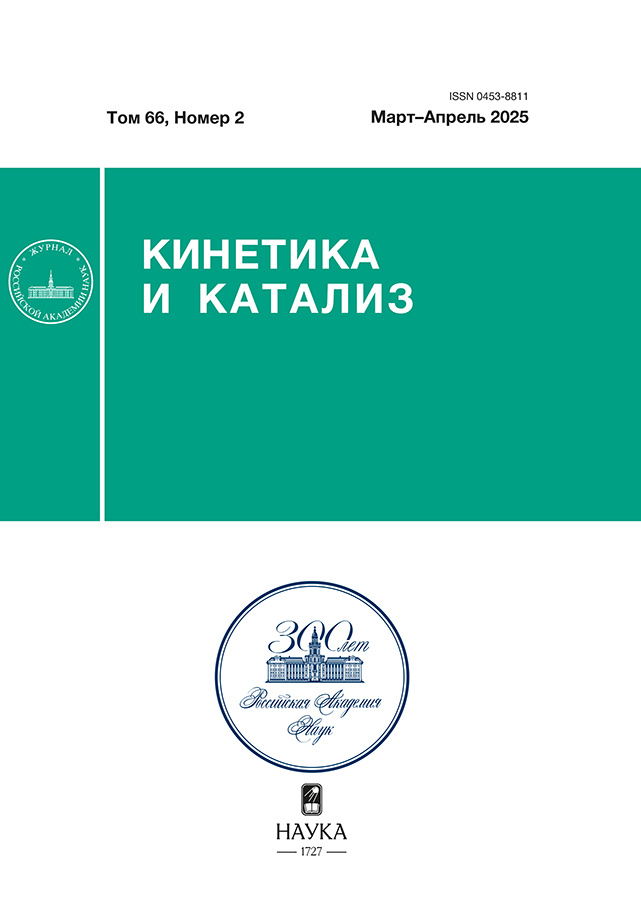Механизм образования триметилпентанов из сложных эфиров в жидкофазном алкилировании изобутана бутенами
- Авторы: Кацман Е.А.1
-
Учреждения:
- МИРЭА – Российский технологический университет
- Выпуск: Том 65, № 4 (2024)
- Страницы: 485-492
- Раздел: СТАТЬИ
- URL: https://vietnamjournal.ru/0453-8811/article/view/684234
- DOI: https://doi.org/10.31857/S0453881124040098
- EDN: https://elibrary.ru/RHLKDQ
- ID: 684234
Цитировать
Полный текст
Аннотация
Изучена последовательность образования изомеров триметилпентана (ТМП) при жидкофазном взаимодействии бутилтрифлатов и бутенов с изобутаном. В составе продуктов алкилирования доля изомеров триметилпентана при гомогенном взаимодействии в изобутане лежит в ряду 2,2,4 > 2,3,4 > 2,3,3 >> >> 2,2,3, а в двухфазной системе изобутан–трифликовая кислота – 2,3,4 > 2,3,3 > 2,2,4 >> 2,2,3. При увеличении времени реакции изомерный состав приближается к составу обычного товарного продукта главным образом за счет изомеризации 2,3,4- и 2,3,3-изомеров в 2,2,4-изомер. Обсуждены особенности возможных механизмов образования первичных продуктов реакции. Ими являются в случае бутенов 2,2,4- и 2,2,3-ТМП, а в случае бутилтрифлатов – 2,3,4- и 2,3,3-ТМП.
Полный текст
Об авторах
Е. А. Кацман
МИРЭА – Российский технологический университет
Автор, ответственный за переписку.
Email: katsman@aha.ru
Россия, Москва
Список литературы
- Xin Z., Jiang H., Zhang Z., Chen Y., Wang J. Kinetic Model of Olefins/Isobutane Alkylation Using Sulfuric Acid as Catalyst // ACS Omega. 2022, 7, 9513−9526. doi: 10.1021/acsomega.1c06850
- Velázquez H., Cervantes-Martínez S., Martínez-Angel E.A., Gonzalo Hernández-Cortez J., Martínez-Palou R. Production of Alkylate Gasoline Using Methanesulfonic Acid as a Green Catalyst in the Presence of Real Refinery Hydrocarbon Mixtures // Energy & Fuels. 2024. V. 38. № 11. P. 10062. https://doi.org/10.1021/acs.energyfuels.4c00786
- Industrial and Laboratory Alkylations. Eds. L.F. Albright, A.R. Goldsby. Washington: American Chemical Society, 1977. 462 р.
- Schmerling L. The Mechanism of the Alkylation of Paraffins // J. Am. Chem. Soc. 1945. V. 67. № 10. P. 1778. doi: 10.1002/9780470421604
- Berenblyum A.S., Katsman E.A., Hommeltoft S.I. Mathematical Description of Isobutane Alkylation with Butenes in the Presence of Trifluoromethanesulfonic Acid // Ind. Eng. Chem. Res. 2004. V. 43. P. 6988.
- Sampoli M., Marziano N.C., Tortato C. Dissociation of trifluoromethanesulfonic acid in aqueous solutions by Raman spectroscopy // J. Phys. Chem. 1989. V. 93. № 20. Р. 7252.
- Hommeltoft S.I., Ekelund O., Zavilla J. Role of ester intermediates in isobutane alkylation and its consequences for the choice of catalyst system // Ind. Eng. Chem. Res. 1997. V. 36. № 9. Р. 3491.
- Kazansky V.B., Abbenhuis H.C.L., van Santen R., Vorstenbosch M.L.V. NMR study of the role of isopropylsulfates in the two-step “conjunct oligomerization” of propylene and isopentane–propylene alkylation catalyzed by 95% sulfuric acid // Catal. Lett. 2000. V. 69. № 1. P. 51. doi: 10.1023/A:1019089016058
- Katsman E.A., Berenblyum A.S., Zavilla J., Hommeltoft S.I. Poisoning Effect of Acid Soluble Oil on Triflic Acid-Catalyzed Isobutane Alkylation // Kinet. Catal. 2004. V. 45. № 5. Р. 676. DOI: 0023-1584/04/4505- 0676
- Berenblyum A.S., Ovsyannikova L.V., Katsman E.A., Zavilla J., Hommeltoft S.I., Karasev Yu.Z. Acid soluble oil, by-product formed in isobutane alkylation with alkene in the presence of trifluoro methane sulfonic acid. Part I. Acid soluble oil composition and its poisoning effect // Appl. Catal. A: Gen. 2002. V. 232. P. 51.
- Nurmakanova А.Е., Ivashkina Е.N., Ivanchina E.D., Dolganov I.A., Boychenko S.S. Predicting Alkylate Yield and its Hydrocarbon Composition for Sulfuric Acid Catalyzed Isobutane Alkylation with Olefins Using the Method of Mathematical Modeling // Procedia Chem. 2015. V. 15. P. 54.
- Wang P., Wang D., Xu C., Liu J., Gao J. Ab initio calculations on the mechanism of isobutane and 2-butene alkylation reaction catalyzed by hydrofluoric acid // Catal. Today. 2007. V. 125. № 3. P. 263. doi: 10.1016/j.cattod.2007.04.003
- Perdih A., Perdih F. Chemical Interpretation of Octane Number // Acta Chim. Slov. 2006. V. 53. P. 306.
Дополнительные файлы










